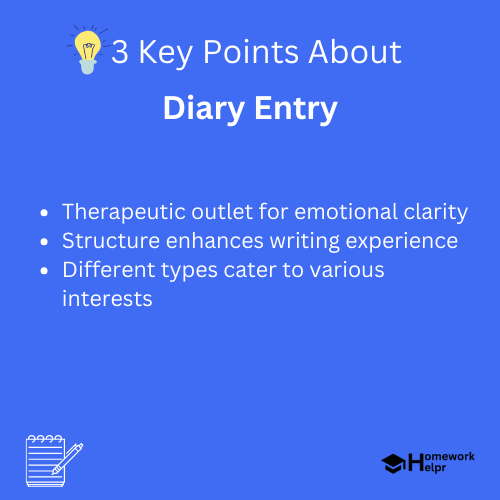📝 Summary
Diary entries are a powerful tool for self-reflection and emotional clarity. They not only document thoughts and feelings but also serve as a therapeutic outlet for understanding personal growth. Each entry typically includes the date, a greeting, the body where you express experiences, and a closing remark. Maintaining honesty and regularity in writing enhances the authenticity of your entries. Different types of diaries, such as personal or gratitude journals, cater to various needs and provide unique benefits for emotional and creative development.
Understanding Diary Entries: A Window to Your Thoughts
A diary entry is more than just a collection of words; it is a personal reflection of your thoughts, feelings, and experiences. In today’s fast-paced world, keeping a diary can serve as a crucial outlet for self-expression and emotional clarity. Many renowned authors, scientists, and even daily individuals have documented their lives in diaries, helping them process events, ideas, and emotions. In this article, we will explore the importance of diary entries, their structure, and some tips to enhance your writing experience.
The Importance of Diary Entries
Writing a diary can yield numerous benefits, including but not limited to:
- Emotional Relief: Pouring your feelings onto paper can be a therapeutic release.
- Self-Reflection: Diary entries allow you to look back at your thoughts and see how you have grown or changed.
- Memory Preservation: Recording events helps preserve memories for the future.
- Creativity Boost: Writing frequently can enhance creative thinking.
Each of these benefits contributes to personal growth and emotional health. For instance, when we write about our daily struggles or joys, we often find solutions to problems we didn’t realize existed.
Definition
Therapeutic: Relating to the healing of diseases or disorders; having the ability to heal.
Examples
Imagine having a tough day at school; writing about your experiences can help you see solutions or realize you aren’t alone in your feelings.
How to Structure a Diary Entry
While there are no strict rules governing diary entries, developing a structure can enhance your writing. A well-structured entry generally consists of:
- The Date: Always begin with the date of your entry to keep track of your thoughts over time.
- The Greeting: A simple “Dear Diary,” or a friendly hello sets the tone.
- The Body: This is where you delve into your experiences, thoughts, and feelings.
- The Closing: End with a sign-off that feels natural to you, such as “Goodnight” or “Until next time.”

This structure can help you gather your thoughts cohesively. The date is essential for tracking your emotional development, while the greeting makes it feel personal. The body is your chance to express everything weighing on your mind, and you can finish with advice, reflections, or hopes.
Definition
Cohesively: In a way that forms a united whole.
Examples
If today was particularly difficult, your entry might start with “Dear Diary,” followed by an explanation of the event and how it made you feel, closing with “Tomorrow is a new day.”
Tips for Writing an Effective Diary Entry
To take full advantage of keeping a diary, consider these helpful tips:
- Write Honestly: Your diary is a safe space; be truthful with your feelings.
- Scribble Freely: Don’t worry about grammar or spelling—just write!
- Use the present tense: Writing in the present can help you connect more vividly with your emotions.
- Be Regular: Try to write daily or weekly to maintain continuity.
These tips ensure your diary remains a true reflection of your inner self. Writing honestly fosters authenticity, while free writing reduces the pressure to produce perfect prose.
❓Did You Know?
Did you know that famous figures like Anne Frank and Leonardo da Vinci kept diaries? Their writings have offered incredible insights into their lives and thoughts!
Different Types of Diary Entries
There are various approaches to diary writing. Here are some popular types:
- Personal Diary: This is the most common type that includes daily experiences and emotions.
- Gratitude Journal: Here, you write down things you are thankful for each day.
- Travel Journal: Document experiences and discoveries during travel.
- Dream Journal: Record your dreams and subconscious thoughts.
Each type of diary caters to different interests and can offer unique benefits. For example, a gratitude journal can improve your overall happiness by encouraging you to focus on positive aspects of life.
Definition
Subconscious: Relating to the part of the mind that is not fully aware but influences actions and feelings.
Examples
If you keep a travel journal, you might note down the sights you see, people you meet, and the feelings you experience along the way.
Conclusion
Writing a diary can be an exhilarating journey of self-discovery. Through diary entries, you can express emotions, set goals, and reflect on your life. With the right structure, writing habits, and types of entries, you can create a significant and personal record of your thoughts and experiences. Engaging with your diary can lead to greater self-understanding, emotional balance, and even creativity. So, grab that notebook, start writing, and let your thoughts flow freely onto the pages. Unleash the writer within you!
Related Questions on Diary Entry
What is the main purpose of a diary entry?
Answer: To reflect on thoughts, feelings, and experiences.
What are the benefits of keeping a diary?
Answer: Emotional relief, self-reflection, and memory preservation.
How should a diary entry be structured?
Answer: Date, greeting, body, and closing.
What types of diary entries can you keep?
Answer: Personal, gratitude, travel, and dream journals.
